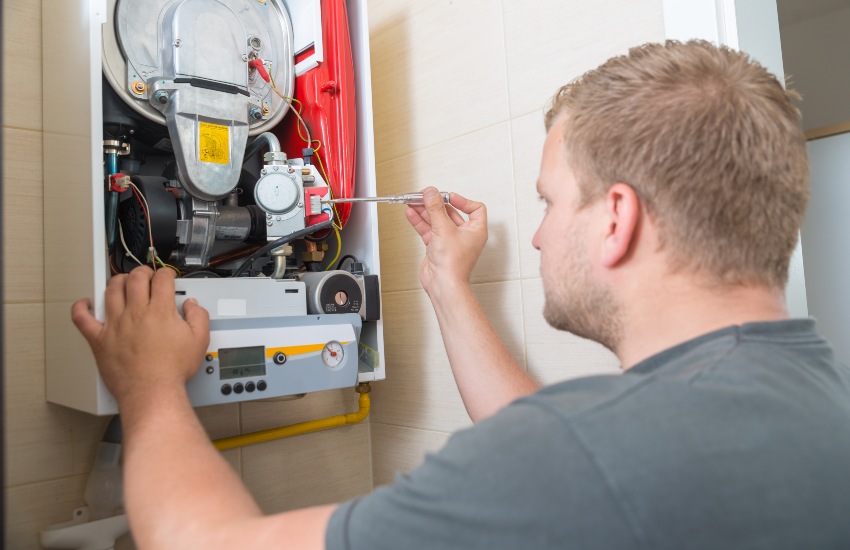Gas vs. Electric Furnace

Choosing the right furnace for your Portland, OR, home is an important decision that will affect your comfort, safety, and energy bills for years to come. With so many options available, deciding which type of furnace is best can be tricky. Luckily, First Call Heating & Cooling is here to help you make an informed decision. As a trusted local HVAC service provider, we can tell you everything you need to know about gas vs. electric furnaces.
Gas Furnaces
Gas furnaces are the most common type of home heating in the US. They work by burning natural gas to heat air, which is then distributed throughout the home via ductwork. Here are some benefits of using a gas furnace:
- Energy efficiency: Gas furnaces can achieve incredibly high efficiency, with some models boasting up to 98% annual fuel utilization efficiency (AFUE).
- Cost savings: Natural gas typically costs less than electricity, resulting in lower heating bills.
- Reliable heating performance: Gas furnaces can quickly and efficiently raise the indoor temperature, even when it drops below freezing outside.
It’s important to keep these considerations in mind when choosing a gas furnace:
- Installation requirements: Gas furnaces require a natural gas line and proper venting, which adds to the installation cost if these are not already in place.
- Safety concerns: Gas leaks and carbon monoxide poisoning are unlikely but worth considering. Install carbon monoxide detectors and heed rotten egg smells that could signal a gas leak.
- Maintenance needs: Gas furnaces require regular maintenance to ensure safe, efficient operation.
First Call Heating & Cooling is proud to be a Trane Comfort Specialist. As such, we recommend the Trane XC95m gas furnace for Portland homes, which boasts a variable-speed blower motor, quiet operation, and up to 97% AFUE.
Electric Furnaces
Electric furnaces use heating elements to warm the air, which is then distributed through the ductwork. Some benefits of using an electric furnace include:
- Ease of installation: Electric furnaces don’t require a gas line or venting, which simplifies the installation process.
- Low upfront cost: Electric furnaces are typically less expensive to purchase and install than gas furnaces.
- Quiet operation: Less-noisy electric furnaces are ideal for heating small living spaces.
Keep these additional considerations in mind when choosing an electric furnace:
- Energy efficiency and electricity bills: Electric furnaces can be highly energy-efficient, but because electricity prices tend to be higher than natural gas, you may end up with higher utility bills.
- Heating performance limitations: Electric furnaces take longer to warm your home, which could lead to insufficient heating during cold spells.
Because of the limitations of electric furnaces, Trane does not offer this option. If electric heating is your best or only option, consider a heat pump instead. This technology uses electricity to move heat rather than generating it from electric resistance coils, resulting in excellent energy efficiency. We recommend the XV20i heat pump for Portland homes. This is Trane’s most efficient model, capable of offering significant savings over an electric furnace.
Comparing Gas and Electric Furnaces
Here’s a side-by-side comparison of the most crucial factors when choosing between gas vs. electric furnaces:
- Cost and energy efficiency: Electric furnaces have lower upfront costs, while gas furnaces save money in the long run thanks to their energy-efficient operation and lower fuel costs.
- Performance: Gas furnaces provide reliable and consistent heating, even in extreme cold, while electric furnaces have limitations in this area.
- Safety: Gas furnaces require professional installation and regular maintenance to prevent gas leaks and carbon monoxide exposure. Electric furnaces don’t have these safety concerns.
- Environmental impact: Gas furnaces produce greenhouse gas emissions, while electric furnaces don’t have direct emissions. However, the overall environmental impact of electric furnaces depends on where the electricity comes from.
To choose the best furnace for your Portland home, consider your specific needs and preferences. If you prioritize energy efficiency and consistent heating in cold temperatures, a gas furnace may be the best option. However, if you have a tight installation budget and only need to heat a small space, an electric furnace may be suitable. It’s also worth considering a heat pump instead of an electric furnace for this system’s many benefits.
Contact First Call Heating & Cooling for Further Guidance
Every home is unique, and there is no one-size-fits-all solution for selecting the right furnace. The decision ultimately comes down to what works best for your home, budget, and heating needs. The experts at First Call Heating & Cooling would be happy to help you determine the best furnace for you. Call us at 503-231-3311 or contact us online for further guidance and to request a furnace installation estimate in Portland, OR.
